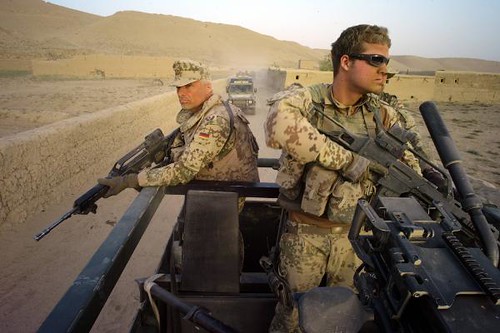
As Germany has spent the last few years preaching about how their superior methods and attitude was winning in the North - the security situation around them started to fall apart.
As in all things military, you need to have the intellectual fortitude to improvise, adapt, and overcome as things change - which they will. If you don't I.A.O., you will lose.
Germany's senior military and civilian leadership refused to morph into a mature nation and instead decided to live in their post-war delusions about the use of miltary power and habit of preening - what was once a peaceful part of AFG became too dangerous for them to operate.
Well, as it is doing throughout AFG - Uncle Sam is starting to take the keys back up north as well.
Germany continues to discuss what to do about its mission in Afghanistan. The US, meanwhile, has decided to send 2,500 soldiers to Kunduz, the region under German command in the northern part of the country. The move is sure to increase the pressure on Chancellor Angela Merkel in Berlin.As Germany is in command of Regional Command North - those USA Soldiers will be under, in a fashion, German command - don't you love the 21st Century?
The visits made by Stanley McChrystal as 2009 changed to 2010 were primarily of a symbolic nature. The US general, head of all NATO soldiers in Afghanistan, flew by helicopter to all corners of the country to thank his troops -- particularly in those areas where the situation is most precarious.But this year, his trip didn't just lead him to those regions in the south and east which have long been instable. The four-star general spent an entire day in Kunduz, the German-controlled region in northern Afghanistan, once known for its relative stability but now descending ever further into violence. The visit made it clear once again that McChrystal is keeping close tabs on developments there.
Indeed, McChrystal's concern has crystallized into concrete orders. According to information obtained by SPIEGEL ONLINE, the US army is to station 2,500 additional troops in Kunduz and the rest of the North as soon as possible:
1,000 additional trainers for the Afghan police force and the Afghan army are to be sent to the second-largest German base in Kunduz by the summer of 2010.
In addition, 1,500 US troops are to head north to protect the US base and to conduct joint anti-Taliban operations with Afghan units.
However, German troops operate under a very restricted series of caveats well beyond NATO Rules of Engagement - caveats that largely keep them out of the fight and out of fully training the AFG forces. First significant case of RC(N) having issues with USA forces caveat-free use of ROE in 3, 2, 1 ......
However, for decades their political leadership have become accustomed to letting English speaking nations do the hard work - and so we find ourselves here.

The approaching increase in US troops for Kunduz has likewise been welcomed in the Defense Ministry in Berlin, primarily because it increases the security of German troops in the region. Away from the public eye, the Bundeswehr has for weeks been working on improving communication with US troops to receive timely and detailed information about US operations in German-controlled territory. During the offensive in November, the Bundeswehr received very little information.Shame - Germany has some great soldiers that could more than do the job of the American soldiers. If the German politicians send more that still cannot fully act - then it is symbolic - the time for symbolism is gone, we need action.
The US decision to boost its presence in northern Afghanistan seems likely to intensify the debate in Germany about sending more troops. Internally, the government in Berlin has already decided to increase German troop numbers by up to 2,000 soldiers, but German Foreign Minister Guido Westerwelle -- head of Chancellor Angela Merkel's junior coalition party the Free Democrats -- has said he will oppose the measure.
An additional 2,500 US troops in the German-controlled areas in northern Afghanistan will also present the question to politicians back in Berlin as to whether they want to allow the US to take over control of the region. German commanders in Afghanistan are already concerned that they will, in the near future, play little more than a supporting role in the region.
However, for decades their political leadership have become accustomed to letting English speaking nations do the hard work - and so we find ourselves here.










No comments:
Post a Comment